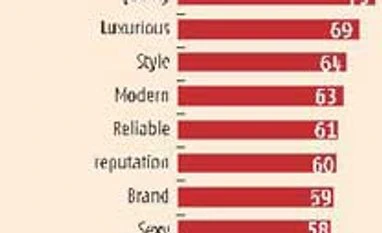Luxury is no longer the preserve of consumers in the metros; the small town buyer is claiming a fair share of the luxury products sold in India according to a CII-IMRB report 'Emerging consumers of Luxury - India Tiers 2 & 3' released recently. Small towns and cities account for about 35 per cent of sales of luxury brands, says the report that covered nine Indian towns and a select sample of resident high net worth individuals (HNIs). It is time that companies focused more closely on these towns and cities as more and more buyers in Aurangabad, Amritsar, Kochi and even Bellary are looking for luxury cars, watches and perfumes.
What is driving the appetite for luxury? Ambitious non-metro consumers indulge in luxury the same way as their metro counterparts do. Their demand is born out of a desire to boost self-esteem and raise the social status of the person the report notes. Aspiration combined with better access to these brands is fuelling demand. "There has been a sizeable growth in luxury consumption primarily because e-commerce is making luxury more accessible," said Gurpreet Wasi, principal consultant, retail business, IMRB International.

It also helps that more families in these cities have extra disposable income. According to the 2015 Kotak Wealth Management report, about 44 per cent of ultra-HNIs are from these cities. Wasi says, "The growth of luxury consumption in Tier 2 and 3 is higher than urban India." Interestingly about half of these individuals are below the age of 40, which makes them more risk friendly.
What do consumers look for in their luxury purchases? Like buyers across the globe, quality is their primary concern. While celebrities do influence purchases, their impact is not as high as perceived; only 29 per cent said that their decisions were taken on the basis of the endorsers. However, celebrities play a larger role in at least one category of luxury purchases, watches. Greater exposure to foreign labels as more and more Indians travel abroad is also a trigger for luxury buys.
The report extensively studied four Indian cities namely Ludhiana, Coimbatore, Bhopal, and Anand to highlight how the perception of luxury across these cities is the same but the justification of spending changes. Consumers in Ludhiana believe luxury helps establish their position in society. According to one of the consumers surveyed by IMRB, "The spelling of car will remain the same whether you buy an Alto or a BMW, but the latter will define your status."
Cars are universally sought after as a status symbol. Even UHNIs from conservative cities such as Coimbatore spend on premium automobiles such as BMW and Audi. Wasi believes that luxury companies need to market themselves to their new consumers without sounding patronising. "I see with growing access and the Internet, consumption in small towns will probably take over from urban consumption in coming years," said Wasi. Get ready for the new jet set.
What is driving the appetite for luxury? Ambitious non-metro consumers indulge in luxury the same way as their metro counterparts do. Their demand is born out of a desire to boost self-esteem and raise the social status of the person the report notes. Aspiration combined with better access to these brands is fuelling demand. "There has been a sizeable growth in luxury consumption primarily because e-commerce is making luxury more accessible," said Gurpreet Wasi, principal consultant, retail business, IMRB International.

It also helps that more families in these cities have extra disposable income. According to the 2015 Kotak Wealth Management report, about 44 per cent of ultra-HNIs are from these cities. Wasi says, "The growth of luxury consumption in Tier 2 and 3 is higher than urban India." Interestingly about half of these individuals are below the age of 40, which makes them more risk friendly.
What do consumers look for in their luxury purchases? Like buyers across the globe, quality is their primary concern. While celebrities do influence purchases, their impact is not as high as perceived; only 29 per cent said that their decisions were taken on the basis of the endorsers. However, celebrities play a larger role in at least one category of luxury purchases, watches. Greater exposure to foreign labels as more and more Indians travel abroad is also a trigger for luxury buys.
The report extensively studied four Indian cities namely Ludhiana, Coimbatore, Bhopal, and Anand to highlight how the perception of luxury across these cities is the same but the justification of spending changes. Consumers in Ludhiana believe luxury helps establish their position in society. According to one of the consumers surveyed by IMRB, "The spelling of car will remain the same whether you buy an Alto or a BMW, but the latter will define your status."
Cars are universally sought after as a status symbol. Even UHNIs from conservative cities such as Coimbatore spend on premium automobiles such as BMW and Audi. Wasi believes that luxury companies need to market themselves to their new consumers without sounding patronising. "I see with growing access and the Internet, consumption in small towns will probably take over from urban consumption in coming years," said Wasi. Get ready for the new jet set.




)